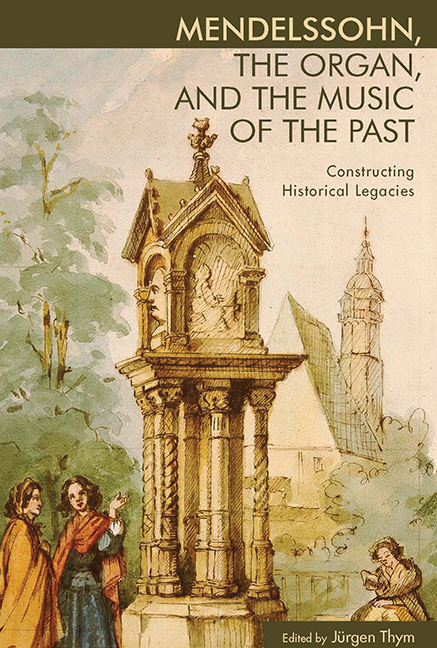Book contents
- Frontmatter
- Dedication
- Contents
- Acknowledgments
- Introduction: Of Statues and Monuments
- Part One Composition and Tradition
- 1 Mendelssohn and the Contrapuntal Tradition
- 2 Mendelssohn and the Catholic Tradition: Roman Influences on His Kirchen-Musik, Op. 23 and Drei Motetten, Op. 39
- 3 Mendelssohn and the Legacy of Beethoven's Ninth: Vocality in the “Reformation” Symphony
- Part Two Mendelssohn and the Organ
- Part Three Mendelssohn's Inherited Legacies in Context
- List of Contributors
- Index
3 - Mendelssohn and the Legacy of Beethoven's Ninth: Vocality in the “Reformation” Symphony
from Part One - Composition and Tradition
Published online by Cambridge University Press: 14 March 2018
- Frontmatter
- Dedication
- Contents
- Acknowledgments
- Introduction: Of Statues and Monuments
- Part One Composition and Tradition
- 1 Mendelssohn and the Contrapuntal Tradition
- 2 Mendelssohn and the Catholic Tradition: Roman Influences on His Kirchen-Musik, Op. 23 and Drei Motetten, Op. 39
- 3 Mendelssohn and the Legacy of Beethoven's Ninth: Vocality in the “Reformation” Symphony
- Part Two Mendelssohn and the Organ
- Part Three Mendelssohn's Inherited Legacies in Context
- List of Contributors
- Index
Summary
The unhappy story of the early reception of Mendelssohn's “Reformation” Symphony (MWV N15, op. posth. 107) is a familiar one. While the composer almost certainly embarked on its composition, in 1829, with an eye toward a performance at Berlin's tercentenary celebration of the June 25, 1530, Augsburg Confession, that celebration went forward without the use of Mendelssohn's work. In the course of the two-year Bildungsreise upon which he embarked the day after the symphony's completion on May 12, 1830, none of Mendelssohn's several campaigns to secure a premiere for the symphony came to fruition. Perhaps most heartbreaking was the last of these, a projected 1832 performance at the Paris Conservatoire, which Mendelssohn anticipated with unchecked optimism. In a letter of February 13, 1832, detailing the impressive array of Paris performances he was then looking forward to—his A-Minor String Quartet(MWV R22, op. 13), Midsummer Night's Dream overture (MWV P3. op. 21), and G-Minor Concerto (MWV O7, op. 25) had all been programmed—he concludes, “But most of all I look forward to the symphony in D minor, which they rehearse next week; I would never have dreamed that I should hear it in Paris for the first time.” It is just as well he had not dreamed such dreams, as plans for the Paris performance did not survive that first rehearsal. The piece finally enjoyed a somewhat anticlimactic premiere on November 15, back in Berlin, where the impression it made clearly fell short of Mendelssohn's hopes. He apparently never heard the work again, and it remained unpublished at the time of his death.
The reasons for the failure of the 1830 Berlin performance remain obscure; Judith Silber Ballan has shown that, if a commission for that celebration had ever existed, it had fallen through by mid-April, weeks before Mendelssohn's (long-delayed) mid-May completion of the work. But none of the three possible explanations that Silber Ballan considers most seriously—reluctance to perform the music of a Jewish-born composer at such an event, questions about the appropriateness of a symphony per se, or deference to emerging local composer Eduard Grell's more obvious candidacy—was likely to have stung Mendelssohn as keenly as the grounds for the work's 1832 rejection in Paris, which appear to have been purely artistic.
- Type
- Chapter
- Information
- Mendelssohn, the Organ, and the Music of the PastConstructing Historical Legacies, pp. 61 - 88Publisher: Boydell & BrewerPrint publication year: 2014

